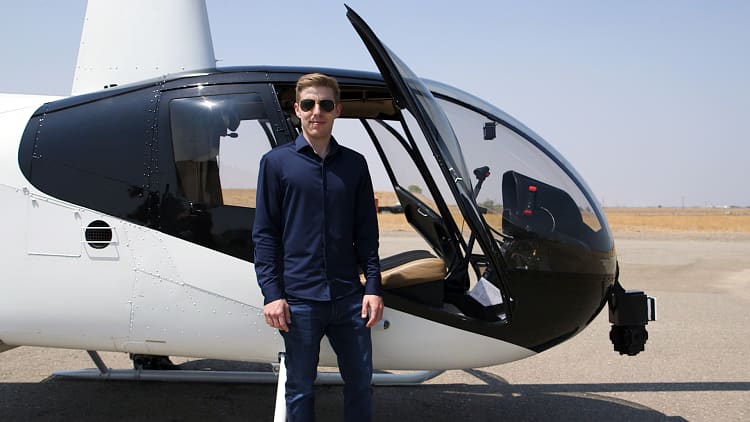Mark Groden has always looked to the sky.
He grew up in the Midwest, and his family moved 13 times.
"That meant a large part of my childhood was sitting in the back seat of a car looking out the window, just very frustrated with the state of transportation," said Groden, CEO and founder of SkyRyse. "I became really passionate in aerospace engineering when I was pretty young, so I recognize that aircraft could one day potentially provide a mode of transportation that would really revolutionize the way that we got around."
He took his childhood dream to fly over traffic seriously. When he was 16, he invented a unmanned aerial vehicle for the Air Force, and then went on to get his Ph.D. in sensor data fusion from University of Michigan. Then in 2016, when he was 26, he founded SkyRyse. The company, which has been flying under the radar, is coming out of stealth mode on Tuesday.
Its mission is to "make air transportation accessible and safe for everyone as a new mode of transportation," Groden said. "One day to replace terrestrial modes of transportation."
The start-up, based near Silicon Valley in Hayward, California, has grown to a team of about 20 people who come from Space X, Boeing, Airbus and NASA.
Groden said the goal of the company is to build autonomous flying taxis that are similarly priced to Lyft, Uber or Didi.
"Somewhere in the span of a five to 10 years, it will be possible to request an aircraft that's vertical takeoff and landing capable to a location not too far from your origin or destination," he said.
The company is launching by building its technology into helicopters for testing and data collection. To start, it has a partnership with the city of Tracy, California. It added sensors, radar and cameras to make Tracy's first responder helicopter safer and easier to fly in tough conditions like fog.
"After just five days of operating, we had responded to over 22 calls and even did a mission with the FBI," Groden said. "We were frankly surprised at how much we were able to add to their capability of getting to a scene quickly. We were on the scene faster than all ground units for every single 911 call last week."
The company will use the data collected on board to improve autonomous flight capabilities.
But SkyRyse is not the only start-up that envisions a future with flying taxis. Companies like Volocopter and Uber are working toward that goal. But unlike those companies, SkyRyse is not building an aircraft from scratch. Instead, it plans to build its autonomous flying system into already-developed aircraft like helicopters.
"Last I heard, Uber suggested that they would be launching their system in 10 years. We expect to be launching far sooner than in 10 years," Groden said. "We are already flying today with technology on board aircraft and missions in Tracy. And that's something that we know of no other company within this technology space doing."
But even when the technology is ready, other hurdles could get in the way.
"Public perception needs to be there so people need to be comfortable having aircraft flying over their heads and being inside of them," he said. "Then there's a regulatory aspect. So the FAA and other regulatory bodies don't yet have the regulations needed to even consider autonomous flight."
Since it started, the company has raised $25 million led by Venrock, with participation from Eclipse, Stanford University, Industry Ventures, Trucks VC, Cantos and Engage Ventures.



